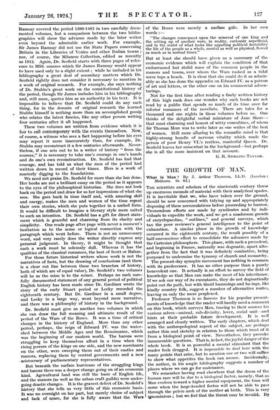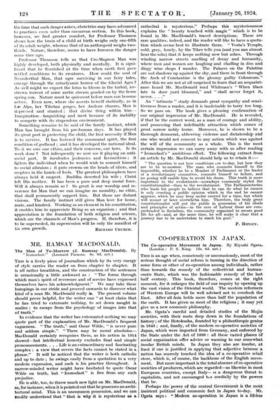THE GROWTH OF MAN.
Tim scientists and scholars of the nineteenth century threw up enormous mounds of material with their analytical spades.
It is inevitable that we, who have taken over the ground, should be now concerned with tidying up and appropriately disposing of these accumulations before proceeding to burrow.
Tremendous efforts are made by syndicates and by indi- viduals to expedite the work, and we get a mushroom growth of encyclopaedias, " outlines," and general surveys, which tax the poor reviewer's general intelligence to the point of exhaustion. A similar phase in the growth of knowledge occurred in the eighteenth century, the result possibly of a half-unconscious effort to consolidate the advances made by the Cartesian philosophers. This phase, with such a precedent, and beginning in France, naturally was dogmatic, apart alto- gether from the fact that it was definitely combative, being purposed to undermine the tyranny of church and monarchy.
The present-day synoptic movement has nothing in common with its predecessor. It has no other purpose than a purely benevolent one. It actually is an effort to survey the field of knowledge so that Man can make the most of his inheritance. If we ask our way of its executants, they do not dogmatically point out the path, but with timid hummings and ha-ings, like kindly country folk, suggest a number of alternative routes, leaving us only the more perplexed.
Professor Thomson is so famous for his popular present- ments of knowledge that the reader will hardly need a comment on this book, which surveys Man, tracing to their sources his various selves—animal, sub-divinity, lover, social unit—and hints at their probable future development. It is well arranged and clearly written. The early chapters, which deal with the anthropological aspect of the subject, are perhaps rather thin and sketchy in relation to those which treat of it from a biological point of view. Nevertheless, they provoke innumerable questions. That is, in fact, the joyful danger of the whole book. It is so powerful a mental. stimulant that the reader feels drugged. It is impossible to deal here with the many points that arise, but to mention one or two will suffice to show what appetites the book can arouse. Incidentally, the author, in his ample bibliography suggests a number of places where we can go for sustenance. We remember having read elsewhere that the doom of the human race will be due to a biological factor, namely, that as Man evolves toward a higher mental equipment, the time will come when the large-headed foetus will not be able to pass through the pelvic arch of the mother at birth. This is very ignominious ; but we feel that the threat may be invalid. By the time that such danger arises, obstetrics may have advanced to practices even safer than caesarean section. In this book, however, we find greater comfort, for Professor Thomson shows how the brain of a child at birth weighs only one-fifth of its adult weight, whereas that of an anthropoid weighs two- thirds. Nature, therefore, seems to have foreseen the danger some time ago.
Professor Thomson tells us that Cro-Magnon Man was highly developed, both physically and mentally. It is signi- ficant that he flourished at the time when earth first gave settled conditions to its creatures. How could the soul of Neanderthal Man, that ogre surviving in our fairy tales, emerge through the cataclysmic horror of the Glacial Ages ? As -well might we expect the lotus to bloom in the turbid, ice- strewn torrent of some arctic stream goaded on by the fierce spring sun. Nature must be quiescent before man can become active. Even now, where she asserts herself statically, as in h br Alps, her Tibetan gorges, her Andean chasms, Man is depressed and stunted ; that divine thing within him- Imagination—languishing and inert because of its inability to compete with its stupendous environment.
Something remains to be said of the family instinct, which Man has brought from his pre-human days. It has played its great part in protecting the child, the first necessity if Man is to survive. It has fostered the communal spirit, the first condition of godhead ; and it has developed the national ideal. To it we owe our ethics, and their converse, our laws. Is its work done ? Not infrequently we now see it playing an anti- social part. It inculcates jealousies and favouritism ; it falters the individual when he would wish to commit himself to social altruism ; it puts crowns on the heads of idiots, and sceptres in the hands of fools. The greatest philosophers have always held it suspect. Buddha deserted his wife ; Christ left His mother. It has been a pure and deep moral force. Will it always remain so ? So great is our worship and re- verence for Man that we can imagine no morality, no ethic, that shall permanently support him. But those are distant visions. The family instinct still gives Man love for home, mate, and kindred. Working as an element in his constitution, it enables him to appreciate Being as an organism ; and that appreciation is the foundation of both religion and science, which are the channels of Man's progress. If, therefore, it is to be superseded, its supersession will be only the manifest of



































 Previous page
Previous page